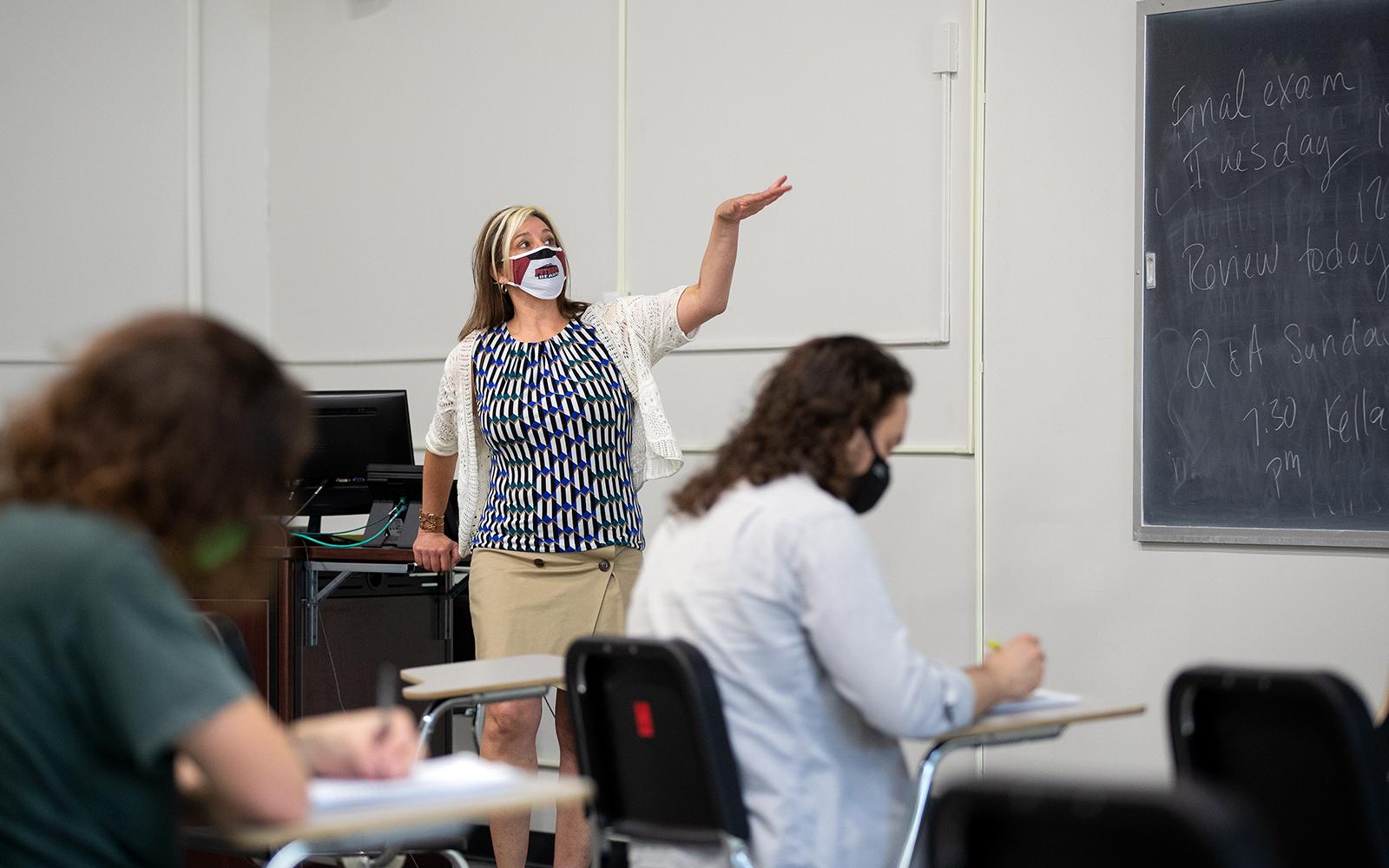In an ever-changing world, SUNY Potsdam is at the forefront of adapting with the times, and developing relevant academic offerings for students. During the Spring 2021 semester, a Cannabusiness class was offered for the first time—one of three new courses that will form the backbone of a Cannabis Studies minor currently being developed.
“I brought this to my department in the Fall of 2019, and there were lots of giggles and a couple of raised eyebrows—there’s a stigma attached to this,” said Dr. Christa Haifley, associate professor of accounting in the Department of Business Administration. “After a while, they were in full support of it. Dean Allen Grant created a small task force, and we brought together professors from all different departments, to formulate what a Cannabis Studies minor would look like.”

Fast forward a year and a half later, and Haifley has just completed teaching her first online Cannabusiness class for 37 students.
Focused on building a business plan for a cannabis-related company, Haifley’s students looked at the industry as a whole: supply chain operations from growing the plants in a greenhouse, to transportation, and sale of cannabis at a dispensary. They also examined the legal ramifications of the cannabis industry. When legislation was passed in March to legalize marijuana in New York State, the classroom discussions became even more relevant.
“The students’ perspective was, ‘This is real, it’s not theoretical anymore,’” she said. “They’re proposing in the State of New York alone, this could have the potential of a $350 million in annual revenue. Early projections indicate an additional 30,000 jobs to the state’s workforce—and given that farming is a very common profession here in Northern New York, the opportunities abound.”

Haifley’s curriculum included historical discussions about the Controlled Substance Act (CSA), established during the Nixon administration in 1970, which criminalized the use of marijuana by listing it as a Schedule I drug. “Given that February was Black History Month, so we spent a lot of time talking about the War on Drugs, which was really a war on People of Color,” she said. “I hope major takeaways are that students understand the industry as it stands today, barriers to entry, the underbaking issue for any cannabis-related business, budgets, social equity programs, and how the taxes from sales and use of cannabis are going to help the underprivileged, and those negatively impacted by the War on Drugs.”
With students in her class pursuing a broad range of majors and minors from speech communication to women’s and gender studies, Haifley was also able to introduce them to important business skills that they may not have been familiar with before. “A lot of them were not business students, so we talked about how to form a budget. I hope personal financial literacy is a takeaway, as well as how to make a budget for a company.”
Haifley brought in Adriana Hemans, a vice president at the ISA Group in Los Angeles to provide a perspective of someone working in the cannabis industry. The ISA Group is a research company specializing in data collection, academic research, qualitative research, custom research, and cannabis research. “She had real life practical examples of branding in the cannabis space, Haifley said. “She gave an excellent presentation to the students about marketing research, surveys conducted on cannabis consumers, and she talked about the different products beyond flower and edibles.”
For one student, meeting Hemans opened the door for a unique internship opportunity. Alexandra Piczkur ’21, an arts management major with a minor in music business, will be working as a Research Associate for the ISA Group this summer as part of a paid internship. Piczkur will be managing a social media project, as well as conducting research on the cannabis industry and undertaking some related marketing projects.
“I took both Accounting 1 and Cannabusiness with Dr. Haifley, and I was lucky enough to form a genuine bond with her,” said Piczkur. “I loved how the course combined applicable and relevant business concepts with creative autonomy on the final business plan. We covered topics ranging from legalities, to social justice and equity programs, to finance and marketing. It was a class I always looked forward to, that prepared me for some unbelievable opportunities.”
Haifley plans to offer the Cannabusiness class every Spring semester, and as the minor is rolled out, it will be one of three core courses students will take for the minor alongside Drug Studies, and Introduction to Cannabis Studies.
“I’ve had a handful of students reach out and thank me and the College for taking this subject seriously. They enjoyed the topics we discussed, and they are eager to learn more,” -Dr. Christa Haifley
Haifley, whose specialty is managerial and cost accounting, just wrapped up her second academic year at SUNY Potsdam. She got her start as a Controller at Blue Ridge Paper Products in Athens, Ga., before moving to the North Country in 2006. From 2007 to 2019 she taught accounting at SUNY Canton prior to her current position in the Department of Business Administration.
“I consider myself an accidental professor. After my first year of teaching accounting, I jumped into a Ph.D. program, I had a child, and then seven and a half years later I finished my Ph.D. while I was teaching,” she explained. “I started here at SUNY Potsdam in the Fall of 2019 as associate professor of accounting, and I absolutely love it.”
To learn more about the Department of Business Administration, visit: www.potsdam.edu/academics/SOEPS/BusinessAdmin
Article and photos by Jason Hunter
